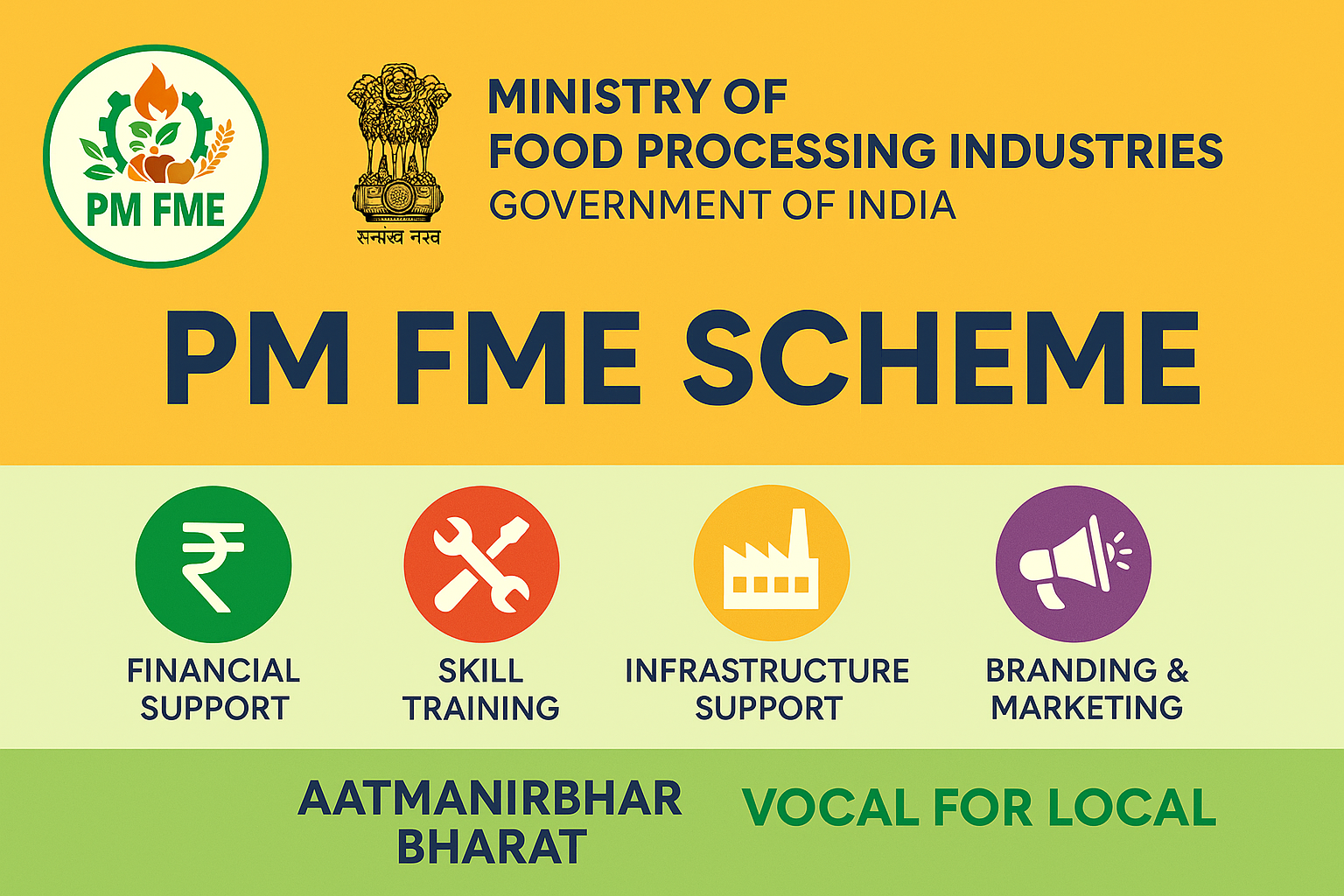Table of Contents
- Introduction: The Vision of a Formalised Food Sector
- Addressing the Challenges of the Unorganised Sector
- Key Objectives and Aims
- Financial Outlay and Funding Pattern
- The ‘One District One Product’ (ODOP) Approach
- Key Components of the Scheme
- Support for Individual Micro Enterprises
- Support for Groups (FPOs, SHGs, and Cooperatives)
- Seed Capital to SHGs
- Creation of Common Infrastructure
- Branding and Marketing Support
- Capacity Building and Research
- Institutional Architecture and Implementation
- How a Technology Partner like Sigma Solutions Can Help
- Frequently Asked Questions (FAQs)
- Conclusion: A Landmark Initiative for a Self-Reliant India
Introduction: The Vision of a Formalised Food Sector
The food processing sector is a cornerstone of the Indian economy, providing livelihood and value to agricultural produce. Within this vast sector, the unorganized micro food processing segment plays a crucial role, contributing significantly to employment and supporting rural households. To unlock the full potential of these enterprises and integrate them into the formal economy, the Ministry of Food Processing Industries (MoFPI) has launched a landmark initiative under the Aatmanirbhar Bharat Abhiyan known as the “PM Formalisation of Micro Food Processing Enterprises Scheme” (PM FME Scheme). This centrally sponsored scheme, with a substantial outlay of ₹10,000 crore, aims to formalise 2 lakh micro food processing enterprises over five years, from 2020-21 to 2024-25. The scheme is a testament to the nation’s resolve to make India self-reliant through “Local Manufacturing, Local Markets, and Local Supply Chain,” as envisioned by the Prime Minister.
Addressing the Challenges of the Unorganised Sector
The unorganized food processing sector, which comprises nearly 25 lakh units and accounts for 74% of employment in the food processing sector, faces numerous challenges that hinder its performance and growth. These micro-enterprises often lack access to modern technology and equipment, which limits their efficiency and quality of production. They also suffer from limited access to institutional credit, making it difficult for them to expand or upgrade their operations. Furthermore, many units lack basic awareness of quality control standards, food safety parameters, and the necessary registrations and licenses, such as FSSAI and GST. This informal nature also affects their ability to build a strong brand or market their products effectively, preventing them from integrating into organised supply chains and reaching a broader consumer base. The PM FME Scheme was specifically designed to address these multifaceted challenges through a comprehensive package of support and services.
Key Objectives and Aims
The PM FME Scheme has a multi-pronged approach to formalising and strengthening the micro food processing sector. Its primary objectives include:
- Increased Access to Credit: To facilitate credit availability for existing micro food processing entrepreneurs for technology upgradation and expansion.
- Capacity Building: To enhance the skills of entrepreneurs through technical knowledge, training, and handholding support services.
- Formalisation: To support the transition of existing enterprises into a formal framework by assisting them with registrations under regulatory bodies.
- Integration with Supply Chains: To integrate these units into the organised supply chain by strengthening their branding and marketing efforts.
- Support for Groups: To provide support to groups such as Farmer Producer Organisations (FPOs), Self Help Groups (SHGs), Producer Cooperatives, and Cooperative Societies.
- Access to Common Facilities: To enable microenterprises to access common services like processing facilities, incubation centres, laboratories, warehouses, and cold storage facilities.
Financial Outlay and Funding Pattern
With a total outlay of ₹10,000 crore, the scheme aims to support 200,000 enterprises over five years. The financial expenditure is shared between the Central and State Governments, with the funding pattern varying based on the state or union territory:
- States & UTs with legislature: 60% Central share, 40% State share.
- Himalayan & North Eastern States: 90% Central share, 10% State share.
- UTs without legislature: 100% Central share.
For the first year of the scheme (2020-21), the expenditure incurred by either the Central or State Governments was borne entirely by the Central Government, with adjustments to be made in the subsequent four years. Funds are disbursed to the States based on the approval of their Project Implementation Plan (PIP).
The ‘One District One Product’ (ODOP) Approach
A core strategy of the PM FME Scheme is its adoption of the ‘One District One Product’ (ODOP) approach. This strategy is designed to leverage the benefits of scale in procurement, common services, and marketing of products. States are tasked with identifying a specific food product for each district, with a focus on perishable agri-produce, cereal-based products, or other widely produced food items. Examples of such products include mango, potato, litchi, tomato, millet-based products, fisheries, poultry, and meat.
While the scheme gives preference to units producing ODOP products, it also supports existing units that produce other products. However, support for common infrastructure, branding, and marketing is exclusively provided for ODOP products. This approach strengthens backward and forward linkages, complementing existing government promotional efforts and cluster development programs.
Key Components of the Scheme
The support under the scheme is categorised into several key components:
1. Support for Individual Micro Enterprises:- Existing individual micro food processing units can receive a credit-linked capital subsidy of 35% of the eligible project cost for expansion or technology upgradation. The maximum subsidy is capped at ₹10 lakh per unit. To be eligible, a beneficiary must contribute a minimum of 10% of the project cost, with the remaining amount covered by a bank loan.
Eligibility Criteria for Individuals:
- The applicant must be an individual or a partnership firm with ownership rights to the enterprise.
- The unit must be an existing micro food processing unit, verified by a Resource Person.
- The applicant must be over 18 years of age and have passed at least the 8th standard.
- Only one person from a single family (self, spouse, and children) is eligible for financial assistance.
Application Process: Applications are invited at the district level through the FME portal, where interested units can apply for assistance. After a scrutiny process, loan proposals are recommended to the banks. A National Nodal Bank is responsible for disbursing the subsidy to the lending banks. The grant amount is deposited into a mirror account opened by the bank in the beneficiary’s name.
2. Support for Groups (FPOs, SHGs, and Cooperatives):- The scheme provides a credit-linked grant of 35% for capital investment to groups such as FPOs, SHGs, and producer cooperatives, with a maximum limit as prescribed. This support is aimed at strengthening the entire value chain within clusters.
Eligibility Criteria for Groups:
- The group should have been engaged in processing ODOP produce for at least three years.
- For FPOs and cooperatives, a minimum turnover of ₹1 crore is required, and the proposed project cost should not exceed their current turnover.
- The group must have sufficient internal resources to cover at least 10% of the project cost and the margin money for working capital.
3. Seed Capital to SHGs The scheme provides a grant of ₹40,000 per member of an SHG engaged in food processing to be used as working capital or for purchasing small tools. This seed capital is provided at the SHG federation level and extended to members as a loan through the SHG. Only SHG members presently engaged in food processing are eligible for this support, and they must commit to utilising the amount for working capital and purchasing small tools.
4. Creation of Common Infrastructure FPOs, SHGs, Producer Cooperatives, State agencies, or private enterprises can receive a credit-linked grant of 35% to create common infrastructure. This can include facilities like common processing units, incubation centres, laboratories, warehouses, and cold storage. The project’s eligibility is determined based on its benefit to farmers and the industry, viability, absence of private investment, and criticality to the value chain.
5. Branding and Marketing Support Marketing and branding support is provided to groups like FPOs, SHGs, and cooperatives to help them develop common packaging and branding, with a focus on quality control and food safety. This support is limited to 50% of the total expenditure. Proposals are appraised and recommended to banks by the State Nodal Agency (SNA) and the State Level Approval Committee. Importantly, the scheme does not provide support for opening retail outlets.
Capacity Building and Research
Training is a vital component of the scheme, ensuring the technical upgradation and formalisation of micro food processing enterprises. Individuals and groups receiving grants must undergo training to upgrade their skills. National-level institutions like the National Institute for Food Technology Entrepreneurship and Management (NIFTEM) and the Indian Institute of Food Processing Technology (IIFPT) are responsible for spearheading these capacity-building efforts. They partner with state-level technology Institutions to conduct training at the cluster level. The training covers a wide range of topics, including entrepreneurship, bookkeeping, FSSAI standards, Udyog Aadhar, GST registration, hygiene, and marketing. The existing infrastructure of Rural Self-Employment Training Institutes (RSETI) is utilised for imparting this training.
Institutional Architecture and Implementation
The scheme has a robust management structure to ensure effective implementation and monitoring at the Central, State, and District levels.
- Central Level: An Inter-Ministerial Empowered Committee (IMEC) chaired by the Minister for Food Processing Industries, oversees the scheme’s implementation, approves guidelines, and sanctions large projects. A Project Executive Committee (PEC) handles administrative functions, and a National Programme Management Unit (NPMU) provides secretarial and managerial support.
- State Level: Each state appoints a Nodal Department and a State Nodal Agency (SNA) to oversee implementation. A State Level Approval Committee (SLAC) sanctions expenditures up to ₹10 lakh.
- District Level: A District Level Committee (DLC) is constituted under the chairmanship of the District Collector. District Resource Persons (DRPs) are appointed by the SNA to provide handholding support to beneficiaries, assisting them with preparing Detailed Project Reports (DPRs), securing bank loans, and obtaining necessary licenses and registrations.
The scheme also lays special focus on supporting SCs, STs, women, and enterprises in aspirational districts. Institutions like TRIFED, National SC Development Finance Corporation, NCDC, and National Rural Livelihood Mission converge their activities to facilitate the identification of eligible units and clusters.
How a Technology Partner like Sigma Solutions Can Help
While the PM FME scheme provides significant financial and technical support, leveraging the expertise of a technology partner can be crucial for a micro food processing enterprise to maximise its benefits and formalise its operations effectively. The term “Sigma Solutions” can refer to several companies specialising in different aspects of the food industry. Their services can align perfectly with the objectives of the PM FME scheme:
- Engineering and Plant Design: Companies like Sigma Process Technologies offer engineering services and can supply turnkey plants for food processing. This is directly relevant to the scheme’s support for technology upgradation and the creation of new units. They can help entrepreneurs design efficient plants with low utility consumption, high yield, and minimised waste, making the project viable and bankable.
- Software and Digital Solutions: Companies like Sigma Solve provide cutting-edge software solutions for supply chain management, inventory control, and food traceability. The PM FME scheme aims to integrate micro-enterprises into organised supply chains, and these digital tools are essential for achieving that goal. They can help units maintain quality standards, reduce waste, and manage their operations efficiently, aligning with the scheme’s formalisation objective.
- Equipment and Machinery: Sigma Design Company and Sigma Packaging & Solutions offer specialised equipment and packaging machinery. This directly supports the capital investment component of the scheme. By procuring modern, high-quality machinery, micro-enterprises can improve productivity and product quality, which is a key goal of the scheme.
- Consulting and Technical Expertise: Other Sigma-branded companies offer consultancy and technical expertise in areas like crop science, sustainability, and quality control. This support is invaluable for capacity building and research, as envisioned by the PM FME scheme. Consultants can help entrepreneurs prepare detailed project reports, understand regulatory requirements like FSSAI, and improve their overall business strategy, ensuring their eligibility and success.
In essence, a technology partner can act as a crucial link, translating the financial support from the PM FME scheme into tangible operational improvements, making micro food processing units more efficient, compliant, and competitive in the long run.
Frequently Asked Questions (FAQs)
1. What is the main objective of the PM FME Scheme?
The primary objective of the PM FME Scheme is to formalise the unorganised micro food processing sector. It aims to provide financial, technical, and business support to existing micro-enterprises, enabling them to upgrade their technology, access credit, and integrate into organised supply chains.
2. Who is eligible for support under the scheme?
The scheme supports both individual micro food processing enterprises and groups. Individual enterprises (proprietary/partnership firms) are eligible, provided the applicant is over 18 years old and has passed the 8th standard. For groups, Farmer Producer Organisations (FPOs), Self Help Groups (SHGs), and Producer Cooperatives are eligible.
3. What is the maximum subsidy available for an individual unit?
An individual micro food processing unit can receive a credit-linked capital subsidy of 35% of the eligible project cost, with a maximum ceiling of ₹10 lakh. The beneficiary must contribute at least 10% of the project cost.
4. What is the ‘One District One Product’ (ODOP) approach?
The ODOP approach is a cluster-based strategy where each district identifies a specific food product to focus on. This helps micro-enterprises in that district benefit from economies of scale in the procurement of inputs, common services, and branding. Support for common infrastructure and branding is exclusively for ODOP products.
5. Can a new food processing unit get assistance under this scheme?
Yes, new units are eligible for support, but only if they are engaged in processing the ODOP product of the district. Support for existing units is available for both ODOP and other products.
6. What is the support provided to Self Help Groups (SHGs)?
SHG members engaged in food processing can receive a grant of ₹40,000 as seed capital per member. This amount is provided for working capital and for purchasing small tools. This support is routed through the SHG federation.
7. How does the scheme help with branding and marketing?
The scheme provides a 50% grant for common branding and marketing activities for groups like FPOs, SHGs, and cooperatives. This support helps them with packaging, quality control, and developing a common brand to market their processed food products.
8. What kind of common infrastructure can be set up under the scheme?
The scheme provides a credit-linked grant for creating common infrastructure such as common processing facilities, incubation centres, cold storage, laboratories, and warehouses. This infrastructure is meant to be available for use by multiple enterprises on a hiring basis.
9. What role do District Resource Persons (DRPs) play?
DRPs are appointed to provide handholding support to beneficiaries. Their responsibilities include helping with the preparation of Detailed Project Reports (DPRs), facilitating bank loans, and assisting with obtaining necessary registrations and licenses, including FSSAI and GST.
10. What is the total budget for the PM FME Scheme?
The scheme has a total outlay of ₹10,000 crore, to be implemented over a five-year period from 2020-21 to 2024-25. The funding is shared between the Central and State Governments, with the ratio varying by state and union territory.
Conclusion: A Landmark Initiative for a Self-Reliant India
The PM Formalisation of Micro Food Processing Enterprises Scheme is a comprehensive and well-structured initiative to empower the unorganised food processing sector in India. By providing targeted financial assistance, building capacity, and creating a formal framework, the scheme not only addresses the core challenges faced by these micro-enterprises but also enables them to integrate into the modern food supply chain. Through its ODOP approach and robust institutional architecture, the scheme paves the way for a more competitive, organised, and prosperous food processing industry, contributing significantly to the vision of a self-reliant India. For more detailed guidelines, you can visit the Ministry’s website.






